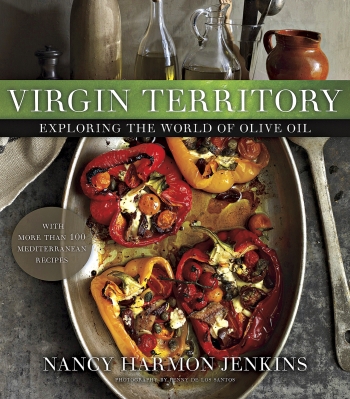The perfect way to start luxuriating in Nancy Harmon Jenkins’ new book, Virgin Territory: Exploring the World of Olive Oil, is at your kitchen table over a glass of wine, thinking about what to make for dinner, imagining the author across from you, confidently sharing her no-nonsense, encyclopedic knowledge about all things olive oil.
You could mistake Virgin Territory for a mere lush cookbook, with its gorgeous photos of over 100 excellent, make-it-now Mediterranean recipes (for example, “Roasted Red Peppers with Anchovies and Tomatoes,” reprinted here on page 76). But the real reason to buy this book is that as you read it, with the author’s warm and slightly bossy voice in your ear, you fall in love with the lore and lure of extra virgin olive oil. There is a reason that U.S. shoppers spend over $700 million a year on EVOO (behind only the dollars we spend on chocolate and coffee), and Nancy Harmon Jenkins understands why.
Harmon Jenkins is the culinary world’s foremost authority on olive oil, but she isn’t one of the rapturous food writers. She is more of an investigative, you-can’t-fool-me reporter who loves her topic. Author of many books, including her bestselling Mediterranean Diet Cookbook, she is a frequent contributor to the New York Times, Saveur, Food & Wine, and Bon Appétit, as well as an international lecturer and leader of food tours around the world. A founder of Oldways Preservation Trust and a mainstay at the Culinary Institute of America (the other CIA), she lives alternately in her hometown of Camden, Maine, and on an olive oil farm in Tuscany.
She shares her love, her biases, her irritated discoveries of duplicitousness in the olive oil business, and her deep friendships with olive oil producers around the world, generously salting her text with facts you won’t find elsewhere. Who knew that the Chinese and the peanut farmers of Georgia are now planting olive trees? Or how olive oil came to dominate animal fat in Italy, displacing lardo, the salted back fat of the pig that was the original mainstay? And why exactly olive oil is beneficial to your health? (Hint: antioxidants and “good cholesterol.”) Most importantly, exactly why is really good olive oil so expensive and so hard to come by?
Harmon Jenkins blasts away some of the myths. Not all olive oil, even if it is packed in gorgeous bottles and labeled “pure EVOO from Tuscany” is pure or Tuscan, nor does it necessarily taste good. By the way, a tip from the pro: Never buy olive oil in a clear bottle. Go for dark bottles and tins. “Light is the enemy of olive oil,” Harmon Jenkins declares.
You’ll find that as you dive deeper into the book it will migrate from the kitchen to the armchair, from the chair to the bedside table. As someone who has read hundreds of cookbooks, I devoured this one. The detailed, chatty directions seem to come from a kitchen goddess muttering just over my shoulder, nudging me to restrain myself with the salt and seasonings, be bolder with the lemon, and above all, respect the extra virgin olive oil. This book is a classic and a keeper.
Kasdon is the founder and CEO of Let’s Talk About Food, a Boston-based nonprofit that develops and fosters literacy, education, and public engagement around our food system.





We ask that those who engage in Wellesley magazine's online community act with honesty, integrity, and respect. (Remember the honor code, alums?) We reserve the right to remove comments by impersonators or comments that are not civil and relevant to the subject at hand. By posting here, you are permitting Wellesley magazine to edit and republish your comment in all media. Please remember that all posts are public.